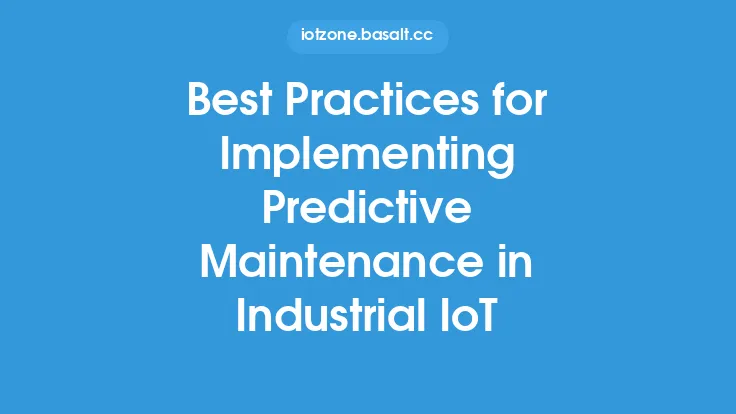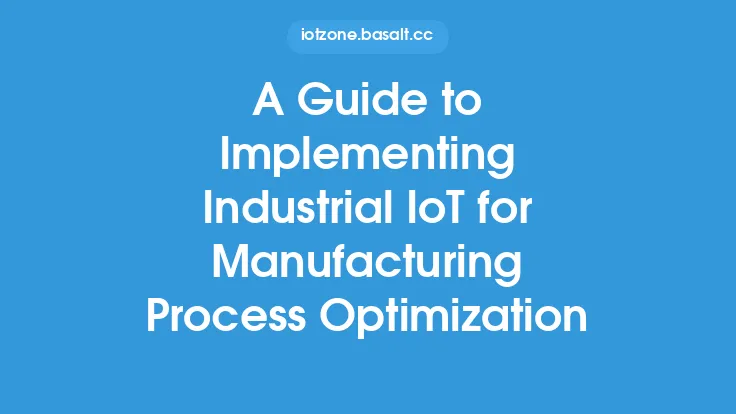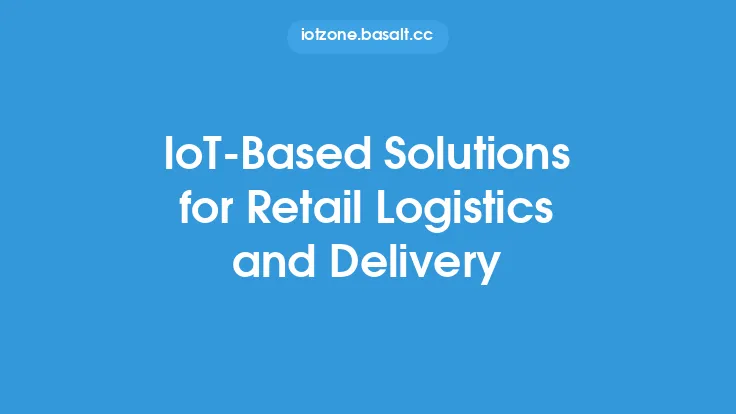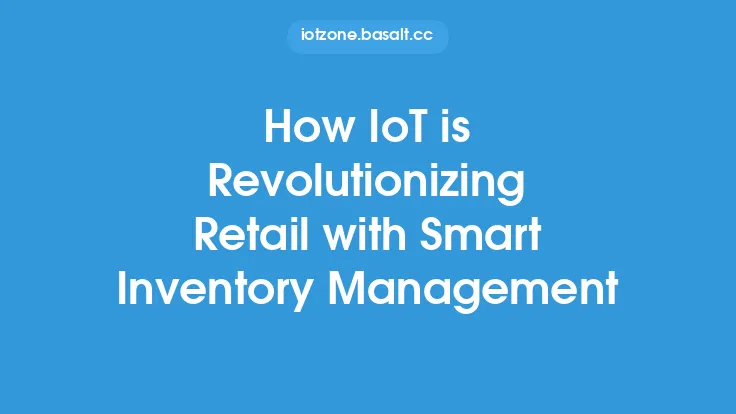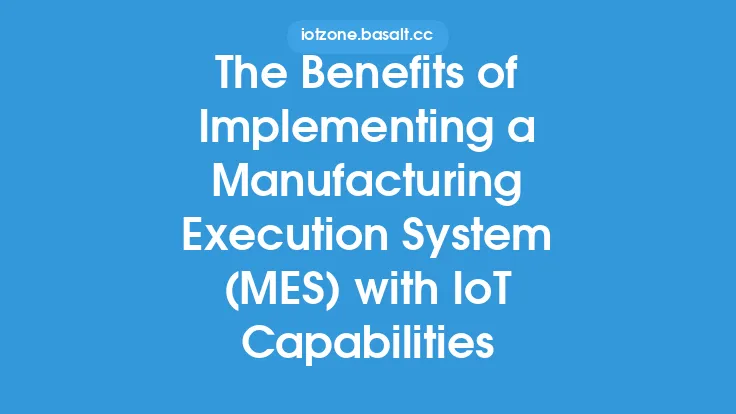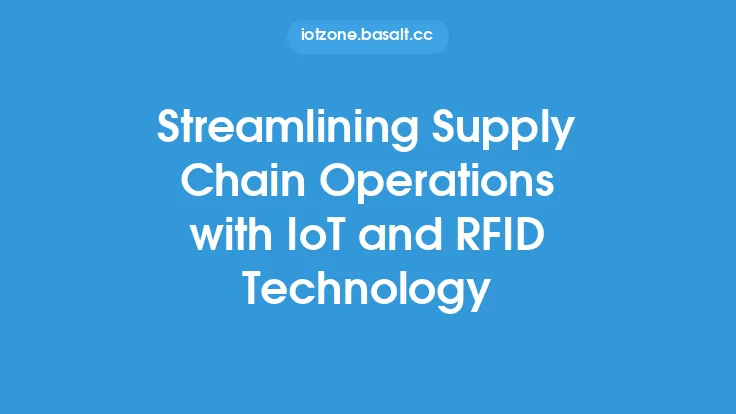The retail industry has undergone significant transformations in recent years, driven by advances in technology and changing consumer behaviors. One key area of innovation is the implementation of Internet of Things (IoT) solutions for automated retail operations. By leveraging IoT, retailers can streamline their processes, improve efficiency, and enhance the overall shopping experience. In this article, we will delve into the world of IoT in retail, exploring its applications, benefits, and technical requirements.
Introduction to IoT in Retail
IoT in retail refers to the use of connected devices, sensors, and data analytics to automate and optimize various aspects of retail operations. This can include inventory management, supply chain logistics, store layout optimization, and customer engagement. IoT devices can collect and transmit data in real-time, enabling retailers to make informed decisions and respond quickly to changing market conditions. From smart shelves and inventory tracking systems to digital signage and mobile payments, IoT is revolutionizing the retail landscape.
Key Applications of IoT in Automated Retail Operations
IoT has numerous applications in automated retail operations, including:
- Inventory Management: IoT sensors and RFID tags can track inventory levels, monitor product movement, and detect stockouts or overstocking. This enables retailers to optimize their inventory management, reduce waste, and improve product availability.
- Supply Chain Optimization: IoT devices can track shipments, monitor warehouse conditions, and optimize logistics routes. This helps retailers to streamline their supply chain, reduce costs, and improve delivery times.
- Store Layout Optimization: IoT sensors and analytics can help retailers to optimize their store layouts, improving customer flow, and increasing sales. By analyzing foot traffic, dwell times, and customer behavior, retailers can create more effective store layouts and improve the overall shopping experience.
- Automated Checkout: IoT-enabled automated checkout systems can streamline the payment process, reducing wait times and improving customer satisfaction. These systems use computer vision, machine learning, and sensor technology to detect products and process payments.
Technical Requirements for IoT Implementation
Implementing IoT solutions in retail requires a range of technical capabilities, including:
- Device Management: Retailers need to manage and maintain a large number of IoT devices, ensuring they are secure, updated, and functioning correctly.
- Data Analytics: IoT devices generate vast amounts of data, which must be collected, processed, and analyzed to extract insights and inform decision-making.
- Network Infrastructure: A robust and secure network infrastructure is essential for supporting IoT devices and ensuring reliable data transmission.
- Security: IoT devices and data must be protected from cyber threats, ensuring the integrity and confidentiality of retail operations.
Benefits of IoT in Automated Retail Operations
The benefits of IoT in automated retail operations are numerous, including:
- Improved Efficiency: IoT solutions can automate many retail processes, reducing labor costs and improving productivity.
- Enhanced Customer Experience: IoT-enabled solutions can improve the shopping experience, providing personalized recommendations, streamlined checkout, and real-time inventory information.
- Increased Accuracy: IoT devices can improve inventory accuracy, reduce stockouts, and prevent overstocking.
- Cost Savings: IoT solutions can help retailers to reduce energy consumption, improve supply chain efficiency, and minimize waste.
Challenges and Limitations of IoT in Retail
While IoT offers many benefits in retail, there are also challenges and limitations to consider, including:
- Interoperability: IoT devices from different manufacturers may not be compatible, creating integration challenges.
- Security: IoT devices and data are vulnerable to cyber threats, requiring robust security measures.
- Data Management: IoT devices generate vast amounts of data, which can be difficult to manage and analyze.
- Cost: Implementing IoT solutions can be costly, requiring significant investment in devices, infrastructure, and personnel.
Best Practices for Implementing IoT in Retail
To ensure successful implementation of IoT in retail, consider the following best practices:
- Start Small: Begin with a pilot project or small-scale implementation to test IoT solutions and refine your approach.
- Collaborate with Suppliers: Work closely with suppliers and manufacturers to ensure interoperability and compatibility of IoT devices.
- Invest in Data Analytics: Develop robust data analytics capabilities to extract insights from IoT data and inform decision-making.
- Prioritize Security: Implement robust security measures to protect IoT devices and data from cyber threats.
Future of IoT in Automated Retail Operations
The future of IoT in automated retail operations is exciting and rapidly evolving. As IoT technology continues to advance, we can expect to see even more innovative applications and solutions. Some potential future developments include:
- Increased Use of AI and Machine Learning: IoT devices will become increasingly integrated with AI and machine learning, enabling more sophisticated analytics and decision-making.
- Growing Importance of Edge Computing: Edge computing will become more critical as IoT devices generate more data, requiring faster processing and analysis.
- Rise of Autonomous Retail: Autonomous retail solutions, such as self-driving delivery vehicles and robotic store assistants, will become more prevalent.
Conclusion
Implementing IoT solutions for automated retail operations can bring numerous benefits, including improved efficiency, enhanced customer experience, and increased accuracy. However, it also requires careful consideration of technical requirements, challenges, and limitations. By following best practices and staying up-to-date with the latest developments, retailers can unlock the full potential of IoT and create a more streamlined, efficient, and customer-centric retail experience. As the retail industry continues to evolve, IoT will play an increasingly important role in shaping the future of retail operations.
